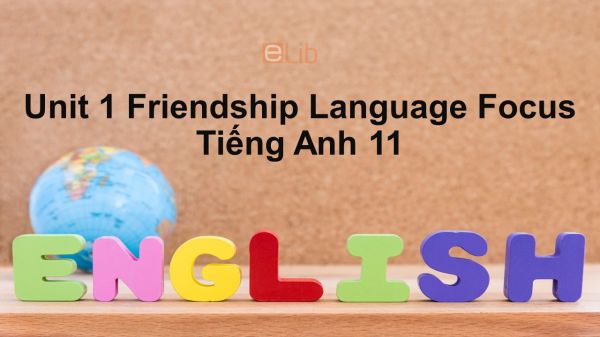Unit 1 lớp 11: Friendship-Language Focus
Bài học Unit 1 lớp 11 Friendship phần Language Focus hướng dẫn các em điểm ngữ pháp về động từ nguyên mẫu có "to" và không có "to". Qua đó giúp các em giải quyết một số dạng bài tập có liên quan đến điểm ngữ pháp này.
Mục lục nội dung

1. Pronunciation Unit 1 lớp 11
Listen and repeat (Nghe và lặp lại)
|
/dʒ/ |
/tʃ/ |
|
jam joke January dangerous passenger village |
children changeable cheese mutual church which |
Practise reading aloud these sentences (Thực hành đọc to những câu sau)
1. Just outside the village, there’s a bridge.
2. Jane always enjoy George’ jokes.
3. Two jeeps went over the edge of the bridge.
4. Which picture do you think the child wants to change?
5. Mix the mushrooms, chilli and cheese.
6. Do you like French salad and fish and chips?
2. Grammar Unit 1 lớp 11
2.1. Exercise 1 Unit 1 lớp 11
Put the words in the correct order to make sentences, writing the main verb in the present simple and making the other an infinitive with to (Đặt các từ đúng thứ tự để tạo thành các câu, viết động từ chính ở thì hiện tại đơn và động từ khác dưới hình thức nguyên mẫu có "to")
Examples
- train catch she a have
She has a train to catch.
- lot of a housework there be do
There is a lot of housework to do.
1. who something eat want?
2. letters I write some have.
3. delighted hear I be the news.
4. my shopping some mother do have.
5. always much talk have you too about.
6. lovely see it again you be.
7. out cold it go too be.
8. passed exams know happy I be that you have the.
Guide to answer
1. Who wants something to eat?
2. I have some letters to write.
3. I am delighted to hear the news.
4. My mother has some shopping to do.
5. You always have too much to talk about.
6. It's lovely to see you again.
7. It's too cold to go out.
8. I'm happy to know that you have passed the exams.
Tạm dịch
1. Ai muốn ăn chút gì nào?
2. Tôi có vài bức thư cần gửi đi.
3. Tôi rất vui khi nghe tin đó.
4. Mẹ của tôi có vài thứ cần mua sắm.
5. Bạn muốn luôn có quá nhiều điều để nói.
6. Thật vui khi được gặp lại bạn.
7. Trời quá lạnh để đi ra ngoài.
8. Tôi rất vui khi biết rằng bạn đã qua các bài thi.
2.2. Exercise 2 Unit 1 lớp 11
Rewrite the sentences, using the words given in brackets (Viết lại câu, sử dụng các từ cho sẵn trong ngoặc)
Examples
- They arrived home late. (He saw)
He saw them arrive home late.
- She didn't want to stay there for the weekend. (They made her)
They made her stay there for the weekend.
1. They got out of the car. (The police watched)
2. They allowed him to write a letter to his wife. (They let)
3. They talked in the next room. (I heard)
4. The customs officer told him to open the briefcase. (The customs officer made)
5. The cat jumped through the window. (The boy saw)
6. Maybe the company will ask him to pay some extra money. (Do you think the company will make)
7. The animal moved towards me, I felt it. (I felt)
8. She wants to go for a picnic. (Do you think her parents will let)
Guide to answer
1. The police watched them get out of the car.
2. They let him write a letter to his wife.
3. I heard them talk in the next room.
4. The customs officer made him open the briefcase.
5. The boy saw the cat jump through the window.
6. Do you think the company will make him pay some extra money?
7. I felt the animal move toward me.
8. Do you think her parents will let her go on a picnic?
Tạm dịch
1. Cảnh sát thấy họ bước ra khỏi xe.
2. Họ để anh ấy viết thư cho vợ.
3. Tôi nghe họ nói chuyện phòng bên cạnh.
4. Nhân viên hải quan bắt anh ta mở hành lý ra.
5. Cậu bé nhìn chú mèo nhảy qua cửa sổ.
6. Bạn có nghĩ công ty sẽ buộc anh ấy trả tiền thừa?
7. Tôi cảm giác con vật đó đi về phía tôi.
8. Bạn có nghĩ bố mẹ cô ấy sẽ để cô ấy đi dã ngoại không?
3. Practice Task 1
Rewrite the sentence or join the pairs of sentences beginning with the word(s) given, using infinitive with to and without to (Viết lại câu hoặc kết hợp hai vế của câu bắt đầu bằng từ/ cụm từ cho trước, sử dụng động từ nguyên mẫu có “to” hoặc không “to”)
1. He worked out the answer. It was clever of him.
2. When we finally heard that David had arrived. We were very relieved.
3. Why have you thrown up your job? You're mad.
4. Jimmy got into his car and drove away. I saw this.
5. It is disappointing that we haven't heard from Molly.
6. Contacting her at work is usually quite easy.
7. Can you sign the papers please? They are ready now.
8. Mr. Pinchley doesn’t allow his teenage children to go out in the evenings.
9. Harry couldn’t get his parents’ permission to buy a motorbike.
10. We can’t possibly work in this noise.
4. Practice Task 2
Choose the correct answers (Chọn câu trả lời đúng nhất)
1. It's possible _________ a train across Canada.
A. take
B. to take
C. taking
D. to be taken
2. It has become necessary ________ water in the metropolitan area because of the severe drought.
A. rationing
B. ration
C. to ration
D. to have rationed
3. Before we leave, let's have Shelley__ a map for us so we won't get lost.
A. draw
B. to draw
C. drawing
D. drawn
4. I think your mother should let you _________ your own mind.
A. made up
B. making up
C. to make up
D. make up
5. Do you know what made so many people _________ their home?
A. evacuate
B. to evacuate
C. evacuated
D. be evacuated
6. _________ bread, you usually need flour, salt, and yeast.
A. Make
B. To make
C. Making
D. For make
7. He was never heard _________ “thank you” in his life
A. say
B. saying
C. to say
D. said
8. I was delighted _________ my old friends again.
A. to see
B. seeing
C. seen
D. to be seen
9. I'd rather _________ to Elvis than the Beatles.
A. listen
B. to listen
C. listening
D. listened
10. He finds it ________ lasting friendships.
A. difficulty in making
B. difficult to make
C. is difficult to make
D. difficult making
Để ôn tập các từ vựng liên quan đến chủ đề "Friendship" và các điểm ngữ pháp có trong Unit 1, mời các em đến với phần trắc nghiệm Unit 1 Language Focus Tiếng Anh 11 sau đây và cùng luyện tập.
6. Conclusion
Qua bài học này, các em cần ghi nhớ một số từ vựng quan trọng trong bài học như sau:
- The infinitive (Động từ nguyên mẫu)
- Infinitive with "to" (động từ nguyên mẫu có "to")
Ta dùng động từ nguyên mẫu có "to" trong một số trường hợp sau:
- Phần lớn các động từ có các động từ khác đi theo sau có cấu trúc là "động từ + to +
động từ nguyên mẫu" như trường hợp các động từ dưới đây:
|
agree refuse promise threaten |
offer attempt manage arrange |
decide plan tend fail |
appear seem hope afford |
forget learn (how) dare pretend |
Examples
He agreed to help me.
She failed to understand him.
They afforded to buy a house after their marriage.
- Sau các động từ dưới đây ta có thể dùng từ nghi vấn (what/how/where/when...) + to
+ động từ nguyên mẫu.
|
remember know |
forget decide |
explain ask |
understand |
Examples
Have you decided where to stay?
I don't know whether to stay or to go?
The teacher explained how to use the computer.
- Đối với những động từ want, ask, expect, help ta có thể dùng hai cấu trúc như sau:
động từ + to + động từ nguyên mẫu
She wanted to go to home.
They asked to use the telephone.
động từ + tân ngữ + to + động từ nguyên mẫu
She asked Mary to help her.
We expected mom to buy us a lot of presents.
They wanted me to stay with them.
- Dùng cấu trúc động từ + tân ngữ + to + động từ nguyên mẫu với những động từ sau
|
tell order |
remind warn |
force invite |
enable teach (how) |
persuade get (= persuade) |
Examples
He forced me to go.
We invited him to go to the party.
He taught us how to repair the bicycle.
- Infinitive without to (Động từ nguyên mẫu không "to")
Ta dùng động từ nguyên mẫu không "to" trong các trường hợp sau đây
- Động từ đứng sau các động từ tình thái (can, could, may, might, should, ...)
She can sing very beautifully.
She may be late.
We should stay at home.
- Make and Let
Các động từ này có cấu trúc động từ + tân ngữ + động từ nguyên mẫu không "to"
Examples
The cold weather made me feel depressed.
They made me do it.
Why don't you let him go?
- Động từ nguyên mẫu không "to" cũng được dùng trong câu mệnh lệnh ở dạng khẳng
định
Go to the board!
Stay at home!
Smile!



